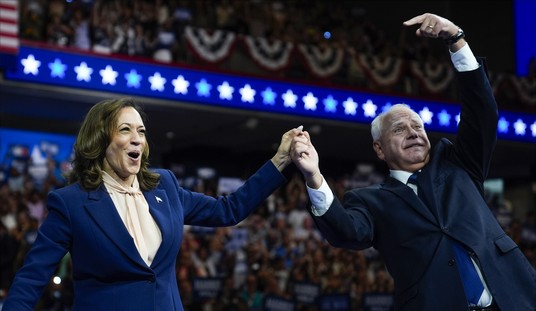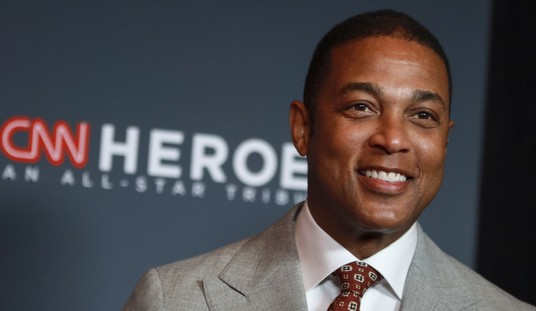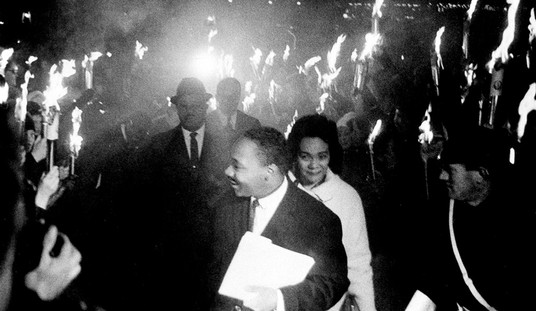John Derbyshire seems to think that since, in his view, Islam and Christianity are equally preposterous, they are equally likely to incite violence: “Mohammed’s flying through the air to Jerusalem on a white steed is no more preposterous than the doctrine of the Immaculate Conception; and so, God’s instructions to us through Mohammed are no more or less likely to make us better or worse than his instructions through Christ.”
Huh? “And so”? One thing is unbelievable, and so is another, and therefore they’re of equal moral value? Come now. I myself find National Socialism no more preposterous than Shakerism – does that mean that National Socialism is no more or less likely to make us better or worse than Shakerism? Does Derbyshire really want to get behind the idea that if something doesn’t ring true to him, it is therefore benign, or at least no more or less benign than some other farrago? I don’t think he does, even as he calls the whole exercise “infantile,” since he also says that he finds my “brief against Islam” to be “persuasive.”
Derbyshire’s review, while marvelously written and delightful to read, is full of inconsistencies. I don’t see how he could possibly find what I reveal about Islam to be “persuasive” if at the same time he thinks that Islamic and Christian doctrine are equally likely to inspire their adherents to commit acts of brutality, since the contrary assertion, as he himself notes, is a major point of my book. He also wonders whether “an equally learned Islamic scholar, bent on making the opposite case, might not produce equally persuasive points, to be then rebutted by Spencer, who would be re-rebutted by the Islamist…” I would welcome such a rebuttal, by the way, unless it were characterized by the torrents of abuse and sly deceptions and diversions that usually come to me from Islamic spokesmen in America, but the point is that while Derbyshire says he is persuaded, he evidently still suspects that I am just engaging in some kind of rhetorical sleight of hand.
And that is by no means the only inconsistency, alas, that mars his elegantly written and thoroughly entertaining review. Derbyshire asserts that “it can hardly be disputed that we have got into the mess we are in with Islam today not so much because of the letter of Islamic theology…as because we have executed policies of staggering idiocy.” Yet what is the nature of that staggering idiocy? The fact that “there are now tens of millions of Muslims living in Christian nations; and this is the case because our nations allowed the tens of millions to enter.” Yet why would that be a problem, if Islam were like Christianity – absurd but ultimately harmless at its core? Obviously the problem with allowing tens of millions of Muslims into the West has to do with “the letter of Islamic theology,” which Derbyshire dismissed as irrelevant just before complaining about the admission of so many adherents of what he sees as a wacky but unthreatening creed.
Derbyshire asks if it is “actually that important” to take on the “‘equivalence’ school of thought, the one that says that there isn’t anything to choose between Christianity and Islam in the way of militancy or obscurantism.” A few weeks ago I was on a TV show on France 24, where I explained that jihadists recruited among peaceful Muslims by referring to the teachings of the Qur’an and Sunnah and presenting themselves as the exponents of true or pure Islam. One of the other guests on the show then responded by asserting that there were passages of the Bible that were equally violent as anything in the Qur’an, and anyway, what about the Crusades? This kind of howling irrelevancy is extraordinarily common; even conservatives such as Ralph Peters, Arnaud de Borchgrave and Dinesh D’Souza have made similar statements on the way to claiming that it was misguided, futile, and somehow in poor taste to investigate the ways in which Islamic texts are used to incite violence. We are supposed to believe, as Christiane Amanpour’s recent CNN series would also have us believe, that all religious traditions have their nutcases, and all of them are marginal, discredited by the majority, and ultimately insignificant. But this – and I’m sure Mr. Derbyshire can appreciate this distinction – is a dogma, not an established fact. And if it is false (and it is), it may be blinding us in numerous ways to the nature and the magnitude of the problem we face, as well as to the steps we need to take to protect ourselves. This cuts both ways: if Christian theocrats are really the threat Chris Hedges, Barry Lynn, and Kevin Phillips think they are, it only plays into the sinister hands of the Bushitler to focus attention on the adherents of the Religion of Peace. This may seem irredeemably nutso to John Derbyshire, but Hedges’ book was a bestseller: considerable numbers of people out there are taking the Christian theocracy scare very, very seriously. So my book is an examination of both threats and both traditions, an examination that has clear, important, and numerous policy implications.
Derbyshire manifests no greater comprehension when denigrating my assertion that Christianity provided the philosophical framework within which modern science could grow and develop, and adduces a few miracle stories from the Bible as proof-texts to the contrary. He dismisses as “Catholic apologetics” without examination the entire extended discussion in my book of the view of God in Catholic scholastic philosophy as good and consistent, versus the Islamic view of Allah as absolute will, unrestricted by any requirement of consistency. The scholastic philosophers believed in miracles too, while managing to create a foundation for scientific investigation by positing this consistency. While I always admire the verve of his writing, I believe Derbyshire has given this point short shrift. “And even if it were true that the church midwifed science,” he says, “is it not the case that, following delivery of the newborn, the midwife’s services are no longer required?” The quip is nice; the thought, shallow. Is it not the case that science, unbounded by any moral sense, leads to dehumanization? (See Aldous Huxley for details.)
But I digress. The ringing peroration of Derbyshire’s review is his declaration that while “Islamia has sunk into the grip of a poisonous ideology-the ideology of jihadism-the Christian West (Spencer actually says ‘Judeo-Christian,’ but that is just a lagniappe) has been seized by an even more destructive ideology: globalization.” (Not a lagniappe at all, but that is a discussion for another time.) He claims that “a great enabler of globalization has been the Christian tradition. If all men are brothers, heathens only a little less enlightened than Christians, they why should not a Pakistani, or a Somali, or for that matter a Mexican, come to live in the U.S.A.?”
One may wonder, given this line of reasoning, why Catholic Europe, at the apex of its self-conscious religiosity, didn’t throw open its doors to the jihadist invaders instead of resisting them. One may wonder why the United States, governed in the main by Protestant Christians for the most part throughout its history, maintained relatively sane immigration policies until the 1960s. Were the Sixties, when immigration controls were effectively ended and globalization gained immense momentum, a time of some great Christian revival? In reality, Christianity has no inherent connection at all with open-borders insanity and globalization. No less prominent a Christian than St. Thomas Aquinas expressed the mainstream Christian view when he said that “after his duties towards God, man owes most to his parents and his country. One’s duties towards one’s parents include one’s obligations towards one’s relatives, because these latter have sprung from [or are connected by ties of blood with] one’s parents…and the services due to one’s country have for their object all one’s fellow-countrymen and all the friends of one’s fatherland.” An open-borders globalist? Not quite.
Then Derbyshire takes me to task for not offering any policy suggestions in this book, although he acknowledges that “possibly he has laid out a program in one of his other books (none of which I have read) and feels no need to repeat himself.” That is indeed the case, and perhaps I should have repeated myself, since the recommendations I have made in several books are no closer to being implemented now than they were when I wrote them. I am not asking Mr. Derbyshire to invest in my older books, as I do not wish to tax his patience unduly with an issue that he has previously described as “stupefyingly dull” (although of course to me my earlier books are jam-packed with boffo, riveting stuff, but never mind), so I’ll summarize them here: they include restrictions on Muslim immigration; a Manhattan Project to find new energy sources and free the U.S. from foreign policy dependence upon Saudi Arabia; an adjustment of our international alliances so as to make aid to states like Egypt and Pakistan contingent upon their actively limiting the teaching of the jihad ideology of Islamic supremacism within their borders; the reclassification of American Muslim groups as political groups, subject to all the scrutiny and accountability to which political groups are normally subject, given the intrinsic political nature of the Sharia; a call to Muslims in America to initiate comprehensive, transparent programs to teach against the aspects of Islam that are at variance with American law and values; and more.
I have said these things and more plainly in %%AMAZON=0895261006 Onward Muslim Soldiers,%% %%AMAZON=0895260131 The Politically Incorrect Guide to Islam (and the Crusades),%% and %%AMAZON=1596980281 The Truth About Muhammad.%% I am not afraid, as Derbyshire posits, of being “cast out from the sphere of ‘acceptable’ commentary into the outer darkness of fringe politics and ‘hate groups’-a term which nowadays seems to embrace anyone who speaks unwelcome truths out loud.” For he is indeed correct that the “hate” label is readily affixed today to anyone who states truths that others find inconvenient for the public to know, and for those on both the Left and the Right (and yes, there are many on the Right) who allow themselves to be manipulated in this way I have nothing but contempt.
As for Derbyshire’s own prescriptions (offered if what I say is true, which he really isn’t sure about), some have a good deal to recommend them, and as he says, there is nothing inherently “immoral or improper” about them. (Others are pure foolishness: bribing Muslims to leave will only drain the treasury: once you start paying for something, you’ve established the need for a supply – almost certainly some would take the money, leave, and come back to take the money again.) They are, of course even more remote from current political reality than mine above, and they spring ultimately from Derbyshire’s lack of belief in the Transcendent: without confidence in the power of truth, there is nothing left but force. Muslims are here in the West, and the hard political reality is that there will only be more of them, and hence more jihadists and Islamic supremacists, in the coming years. We should continue to strive to bring the implications of our disastrous immigration policies and other manifestations of willful ignorance and foolishness to public notice, but we will not be able to rely on law and force alone to get us out of this fix. Thus one last bastion of hope that the Judeo-Christian West does have is that the heart and mind are not immutable. We will have to wage ideological battle on behalf of our threatened civilizational values – a battle for which we are well equipped, as I argue in %%AMAZON=1596985151 Religion of Peace?,%% but which virtually no one is fighting. The truth will out, even against a relentless totalitarianism that appears inexorable. But only if we have the courage to defend it.
That truth, of course, is not coterminous with the desiccated and vacuous Christianity that prevails in so many places today. Derbyshire gets off some of his most engaging shots by playing up that hollow shell as the real thing: “If there were a proposal to impose Sharia law in your town, who would you rather see riding to your aid: Christopher Hitchens, or Bishop Muskens?” – that is, the befuddled Dutch bishop who recommends that Christians in the Netherlands, not hitherto known for speaking Arabic, begin to refer to God as “Allah” to please and pacify their Muslim neighbors. Answer: I’d fight alongside Hitchens in a heartbeat, if he would deign to fight alongside me, which is the real question. In my book, as Derbyshire notes, I call for an alliance with atheists, among others, but for his part I am not sure whether Hitchens would identify me as part of the problem or part of the solution. And there’s the problem: we know we’re under attack, but we have to figure out who or what the enemy is in order to be able to fight properly. Is it religious people? Religion itself? Islamic jihad? Christian theocracy? Determining the answer is the purpose of my book.
But John Derbyshire also wonders whether or not “the humane forbearance of the Prince of Peace, and the moral universalism that His teachings imply, bear the seeds of self-destruction,” and whether the followers of that Prince really have the strength to withstand the onslaught: “If-to put faces on the abstractions-Roger Cardinal Mahoney [sic] and his parishioners were to engage in a waste-lot rumble with Abu Ayyub al-Masri and his parishioners, on which party would Robert Spencer put his money?” On Al-Masri, of course. But aren’t you stacking the deck here a bit? What if Richard Coeur de Lion were to happen upon this waste-lot rumble? Charlemagne? St. Louis IX? Dietrich Bonhoeffer? Walter Ciszek? Alexander Solzhenitsyn? John Paul II?
“Christianity,” Derbyshire concludes, “got its start as a religion of slaves. Perhaps it is fated to end the same way.” Perhaps. But those slaves ultimately captured the empire that enslaved them, and transformed it.










Join the conversation as a VIP Member